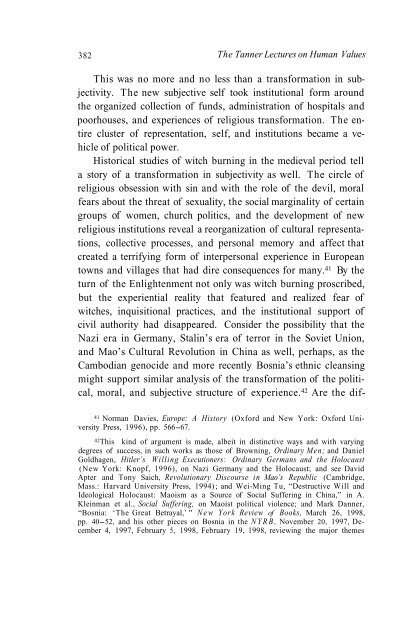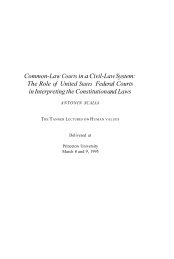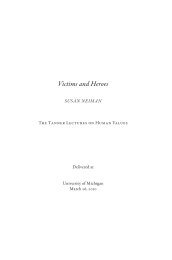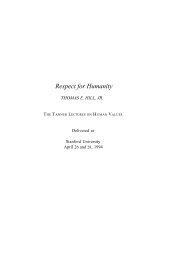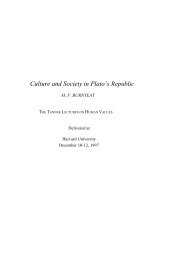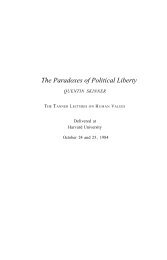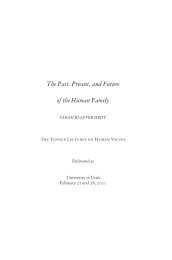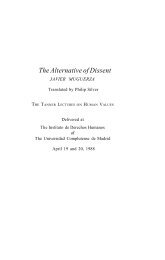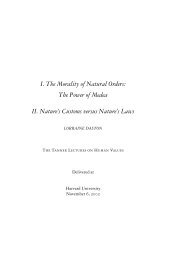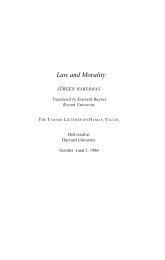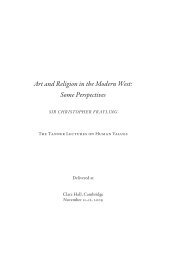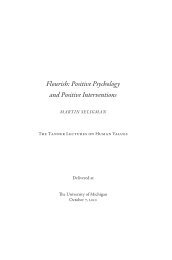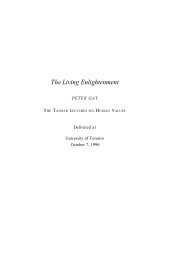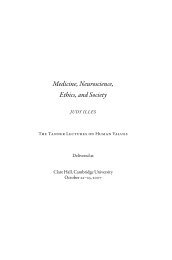Kleinman, Arthur - The Tanner Lectures on Human Values
Kleinman, Arthur - The Tanner Lectures on Human Values
Kleinman, Arthur - The Tanner Lectures on Human Values
Create successful ePaper yourself
Turn your PDF publications into a flip-book with our unique Google optimized e-Paper software.
382 <str<strong>on</strong>g>The</str<strong>on</strong>g> <str<strong>on</strong>g>Tanner</str<strong>on</strong>g> <str<strong>on</strong>g>Lectures</str<strong>on</strong>g> <strong>on</strong> <strong>Human</strong> <strong>Values</strong>This was no more and no less than a transformati<strong>on</strong> in subjectivity.<str<strong>on</strong>g>The</str<strong>on</strong>g> new subjective self took instituti<strong>on</strong>al form aroundthe organized collecti<strong>on</strong> of funds, administrati<strong>on</strong> of hospitals andpoorhouses, and experiences of religious transformati<strong>on</strong>. <str<strong>on</strong>g>The</str<strong>on</strong>g> entirecluster of representati<strong>on</strong>, self, and instituti<strong>on</strong>s became a vehicleof political power.Historical studies of witch burning in the medieval period tella story of a transformati<strong>on</strong> in subjectivity as well. <str<strong>on</strong>g>The</str<strong>on</strong>g> circle ofreligious obsessi<strong>on</strong> with sin and with the role of the devil, moralfears about the threat of sexuality, the social marginality of certaingroups of women, church politics, and the development of newreligious instituti<strong>on</strong>s reveal a reorganizati<strong>on</strong> of cultural representati<strong>on</strong>s,collective processes, and pers<strong>on</strong>al memory and affect thatcreated a terrifying form of interpers<strong>on</strong>al experience in Europeantowns and villages that had dire c<strong>on</strong>sequences for many. 41 By theturn of the Enlightenment not <strong>on</strong>ly was witch burning proscribed,but the experiential reality that featured and realized fear ofwitches, inquisiti<strong>on</strong>al practices, and the instituti<strong>on</strong>al support ofcivil authority had disappeared. C<strong>on</strong>sider the possibility that theNazi era in Germany, Stalin’s era of terror in the Soviet Uni<strong>on</strong>,and Mao’s Cultural Revoluti<strong>on</strong> in China as well, perhaps, as theCambodian genocide and more recently Bosnia’s ethnic cleansingmight support similar analysis of the transformati<strong>on</strong> of the political,moral, and subjective structure of experience. 42 Are the dif-41 Norman Davies, Europe: A History (Oxford and New York: Oxford UniversityPress, 1996), pp. 566-67.42This kind of argument is made, albeit in distinctive ways and with varyingdegrees of success, in such works as those of Browning, Ordinary Men; and DanielGoldhagen, Hitler’s Willing Executi<strong>on</strong>ers: Ordinary Germans and the Holocaust(New York: Knopf, 1996), <strong>on</strong> Nazi Germany and the Holocaust; and see DavidApter and T<strong>on</strong>y Saich, Revoluti<strong>on</strong>ary Discourse in Mao’s Republic (Cambridge,Mass.: Harvard University Press, 1994) ; and Wei-Ming Tu, “Destructive Will andIdeological Holocaust: Maoism as a Source of Social Suffering in China,” in A.<str<strong>on</strong>g>Kleinman</str<strong>on</strong>g> et al., Social Suffering, <strong>on</strong> Maoist political violence; and Mark Danner,“Bosnia: ‘<str<strong>on</strong>g>The</str<strong>on</strong>g> Great Betrayal,’ ‘ I New York Review of Books, March 26, 1998,pp. 40-52, and his other pieces <strong>on</strong> Bosnia in the NYRB, November 20, 1997, December4, 1997, February 5, 1998, February 19, 1998, reviewing the major themes


